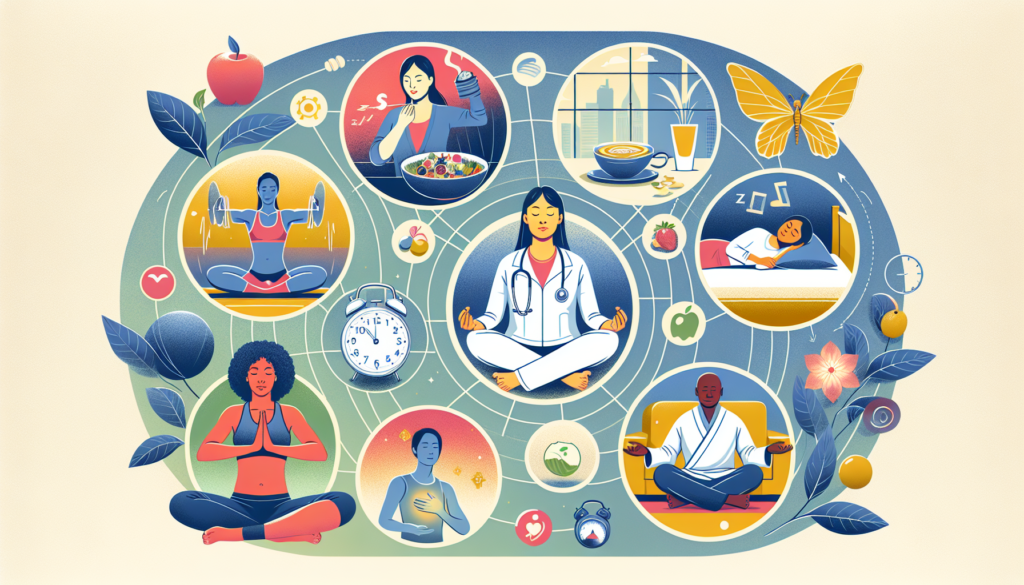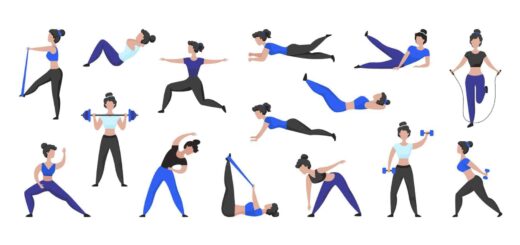10 Tips for Improving Physical Health
Looking for ways to improve your physical health? Look no further! This article provides you with 10 simple and effective tips that you can incorporate into your daily routine. From staying active to making healthier food choices, these tips will guide you towards a healthier lifestyle, boosting your overall well-being. So, let’s dive right in and discover how you can improve your physical health today!

Exercise regularly
Regular exercise is essential for maintaining good physical health. It not only helps to keep your body in shape but also improves your overall well-being. When choosing an exercise routine, it’s important to consider your current fitness level. If you’re just starting out, opt for activities that are low-impact and gradually increase the intensity as your fitness improves. This could include walking, swimming, or cycling.
Setting realistic goals for your exercise regimen is crucial. It’s important to avoid pushing yourself too hard too quickly, as this can lead to injury or burnout. Start with small, achievable goals and gradually work your way up. This will help you stay motivated and make steady progress.
To prevent boredom, it’s important to mix up your workouts. Incorporate a variety of activities such as cardio, strength training, and flexibility exercises. This not only keeps things interesting but also ensures that you’re targeting different muscle groups and reaping the benefits of a well-rounded fitness routine.
Make exercise a part of your daily routine. Find a time that works best for you and stick to it. Whether it’s early in the morning, during your lunch break, or in the evening, consistency is key. By making exercise a habit, it becomes easier to stick to and becomes a natural part of your day.
However, it’s important to listen to your body and avoid overexertion. Pushing yourself too hard can lead to injury and hinder your progress. Pay attention to any signs of fatigue or discomfort and adjust your exercise intensity accordingly. Taking rest days and giving your body time to recover is just as important as the exercise itself.
Eat a balanced and nutritious diet
A balanced and nutritious diet plays a vital role in maintaining good physical health. It provides the necessary nutrients and energy for your body to function optimally. Including a variety of fruits and vegetables in your meals is important, as they are rich in vitamins, minerals, and antioxidants. Aim to have at least five servings of fruits and vegetables daily to ensure you’re getting a wide range of nutrients.
Consuming whole grains is important for sustained energy levels throughout the day. Opt for whole wheat bread, brown rice, and whole grain cereals. These provide complex carbohydrates that are digested slowly, providing a steady release of energy.
Limit your intake of processed and sugary foods. These are often high in unhealthy fats, added sugars, and sodium. Instead, focus on whole, unprocessed foods as much as possible. Reading food labels can help you make healthier choices and be conscious of what you’re putting into your body.
Staying hydrated is also a crucial aspect of maintaining good physical health. Drink enough water throughout the day to keep your body functioning properly. Avoid excessive consumption of sugary beverages such as soda and fruit juices, as they can contribute to weight gain and other health issues.
To avoid skipping meals and practice portion control. Skipping meals can lead to overeating later in the day, while portion control ensures you’re consuming the right amount of food for your body’s needs. Listen to your body’s hunger and fullness cues and be mindful of portion sizes.
Get enough sleep
Sleep is often overlooked when it comes to physical health, but it plays a crucial role in overall well-being. Establishing a consistent sleep schedule is important to regulate your body’s internal clock and improve the quality of your sleep. Try to go to bed and wake up at the same time every day, even on weekends.
Creating a relaxing bedtime routine can help signal to your body that it’s time to unwind and prepare for sleep. This may include activities such as reading a book, taking a warm bath, or practicing relaxation techniques like deep breathing or meditation. Find what works best for you and make it a habit.
Maintaining a comfortable sleep environment is essential for a good night’s rest. Your bedroom should be cool, dark, and quiet. Invest in a comfortable mattress and pillows that support your body and promote proper alignment. Consider using earplugs, an eye mask, or white noise machines to block out any distractions that may disrupt your sleep.
Avoid electronic devices before bedtime, as the blue light emitted by these devices can interfere with your body’s natural sleep cycle. Instead, opt for calming activities that help you relax and unwind. This will promote better sleep quality and improve your overall physical health.
Caffeine and alcohol can disrupt your sleep patterns, so it’s important to avoid consuming these substances close to bedtime. While caffeine is a stimulant that can interfere with falling asleep, alcohol may disrupt the quality of your sleep and leave you feeling less rested. Limit your intake of both to improve your sleep and overall physical health.
Manage stress levels
Stress can have a negative impact on your physical health, so it’s important to find effective ways to manage and reduce stress in your life. Practicing relaxation techniques such as deep breathing, meditation, or yoga can help calm your mind and body. These techniques are simple, yet powerful, tools that can be done anywhere and at any time.
Engaging in activities that you enjoy and help you unwind can significantly reduce stress levels. This could include hobbies such as painting, playing a musical instrument, or gardening. Find activities that bring you joy and make time for them regularly.
Finding healthy coping mechanisms for stress is crucial. Instead of turning to unhealthy habits like excessive drinking or overeating, explore healthier alternatives. Talking to a friend or family member about your stress, journaling your thoughts and feelings, or seeking professional help if needed are all effective strategies for managing stress.
Prioritize self-care and take breaks when needed. It’s important to listen to your body and give yourself time to rest and recharge. Engaging in activities that promote self-care, such as taking a bath, reading a book, or practicing mindfulness, can help you relax and rejuvenate.
Identifying and addressing the sources of stress in your life is essential for reducing its impact on your physical health. Reflect on what may be causing you stress and consider making appropriate changes. This may involve setting boundaries, delegating tasks, or seeking support from loved ones or professionals.

Maintain a healthy weight
Maintaining a healthy weight is important for overall physical health and reducing the risk of certain health conditions. Monitoring your calorie intake and portion sizes can help you achieve and maintain a healthy weight. Be mindful of the types of foods you consume and aim for a well-balanced diet.
Engaging in regular physical activity is key to burning calories and maintaining a healthy weight. Find activities that you enjoy and make them a part of your routine. This could include going for a walk, jogging, dancing, or joining a sports team. The key is to find activities that you enjoy and that fit into your lifestyle.
Consulting a healthcare professional, such as a registered dietitian or a personal trainer, can provide personalized weight management advice. They can assess your individual needs and help you develop a plan that is tailored to your goals and preferences.
Avoid crash diets or extreme weight loss methods, as these are often unsustainable and can be detrimental to your overall health. Focus on making sustainable lifestyle changes that promote long-term weight management. This includes adopting healthy eating habits, being physically active, and maintaining a positive mindset towards your body.
Setting realistic and achievable weight loss or maintenance goals is essential. Aiming for gradual, steady progress is not only more sustainable but also reduces the risk of negative health effects associated with rapid weight loss. Remember that everyone’s journey is unique, and it’s important to celebrate progress, no matter how small.
Stay hydrated
Staying hydrated is often overlooked but plays a crucial role in maintaining good physical health. Drinking an adequate amount of water throughout the day is important for various bodily functions. The general recommendation is to drink at least eight cups (64 ounces) of water per day, but individual needs may vary.
Avoid excessive consumption of sugary beverages, such as soda and sports drinks. These can contribute to weight gain and other health issues. Instead, opt for water as your primary source of hydration. You can also incorporate herbal tea or infused water for variety and additional health benefits.
Monitoring your urine color is a simple way to ensure proper hydration. Your urine should be pale yellow to clear in color. If it’s dark yellow, this is an indication that you need to drink more water. Be mindful of your fluid intake, especially during physical activity or hot weather, as your body loses water through sweat.
Be mindful of your fluid intake during physical activity or hot weather. Increase your water consumption to compensate for the additional fluid loss. Consider carrying a reusable water bottle with you to make it easier to stay hydrated throughout the day.
Limit alcohol and tobacco use
Moderating your alcohol consumption is key to maintaining good physical health. Excessive alcohol intake can have detrimental effects on various organs and increase the risk of chronic diseases. It’s important to be mindful of your alcohol consumption and avoid binge drinking. Set limits for yourself and know your own tolerance.
If you find it challenging to moderate your alcohol consumption or suspect that you may have an alcohol addiction, it’s important to seek help. There are various resources available, such as support groups or professional counseling, that can provide guidance and support in overcoming alcohol addiction.
Quitting smoking or reducing tobacco use is another important step towards improving physical health. Smoking is a leading cause of preventable diseases and can have severe effects on multiple body systems. Explore options for smoking cessation, such as nicotine replacement therapy or support groups. These resources can provide assistance and increase your chances of successfully quitting.
Educate yourself about the health risks associated with alcohol and tobacco. Knowing the potential negative impacts on your physical health can be a powerful motivator for making positive changes. Stay informed and arm yourself with the knowledge needed to take control of your habits and prioritize your physical well-being.
Practice good hygiene
Practicing good hygiene is essential for maintaining good physical health. Simple habits such as washing your hands frequently with soap and water can prevent the spread of germs and protect you from infections. Make it a habit to wash your hands before meals, after using the restroom, and after touching surfaces in public places.
Maintaining a regular dental hygiene routine is crucial for oral health. Brush your teeth at least twice a day and floss daily to remove plaque and prevent gum disease. Consider using mouthwash to further enhance your oral hygiene routine.
Shower regularly and keep your skin clean. Regular bathing helps to remove dirt, sweat, and dead skin cells. It also helps to prevent body odor and skin infections. Use mild soap or cleansers, and moisturize your skin to keep it healthy and hydrated.
Clean and trim your nails regularly. This helps to prevent the buildup of dirt and bacteria underneath the nails, which can lead to infections. Keep your nails trimmed and use a nail brush to clean underneath them.
Practicing safe sex is important to prevent sexually transmitted infections. Use condoms or other barrier methods to protect yourself and your partner. Get tested regularly for STIs and speak openly with your healthcare provider about any concerns or questions you may have.
Prioritize mental health
Physical health and mental health are closely interconnected, and prioritizing your mental well-being is crucial for overall health. If you experience symptoms of mental health disorders such as anxiety or depression, it’s important to seek professional help. Mental health professionals can provide support and guide you towards appropriate treatment options.
Engaging in activities that promote mental well-being can significantly improve your overall health. Mindfulness practices such as meditation or yoga can help reduce stress, improve focus, and promote a sense of calmness. Find activities that bring you joy and help you relax, whether it’s reading, painting, or spending time in nature. Make time for these activities regularly.
Building a support system of friends and loved ones can provide a strong foundation for mental well-being. Surround yourself with people who uplift and support you. Share your thoughts and feelings with trusted individuals who can offer a listening ear or provide guidance when needed.
Taking breaks and making time for relaxation is crucial for maintaining good mental health. Set aside time each day to engage in activities that help you recharge, whether it’s taking a walk, enjoying a hobby, or simply practicing self-care. Remember, it’s okay to take breaks and prioritize your mental well-being.
Addressing and managing any underlying emotional issues is important for overall mental health. Take the time to reflect on your emotional state and seek professional help if needed. Therapy or counseling can provide valuable tools and insights to help you navigate and overcome emotional challenges. Don’t hesitate to reach out for support when you need it.
Regular medical check-ups
Regular medical check-ups play a crucial role in maintaining good physical health. Schedule regular appointments with your primary care physician to monitor your overall health. These appointments can help catch potential health issues early and allow for prompt intervention.
Following recommended screenings and vaccinations is important for preventing and detecting diseases. Stay up to date with screenings such as mammograms, pap smears, and colonoscopies, as well as vaccinations for diseases such as influenza and HPV. These preventive measures can go a long way in safeguarding your health.
Discuss any concerns or symptoms with your healthcare provider. In addition to regular check-ups, it’s important to seek medical attention if you notice any changes or experience unusual symptoms. Your healthcare provider can assess your symptoms and provide appropriate guidance or referrals.
Keep track of your medical history and test results. Maintaining organized records allows both you and your healthcare provider to have a comprehensive overview of your health. This can aid in identifying patterns or trends, as well as facilitating better communication and decision-making regarding your healthcare.
Adhering to prescribed medications and treatment plans is vital for managing chronic conditions and ensuring optimal health. Follow your healthcare provider’s recommendations and take medications as directed. If you have questions or concerns, don’t hesitate to reach out to your healthcare provider for clarification or guidance.

















It's great that you talked about how business insurance can provide financial protection against unexpected events and help ensure the…
I like that you mentioned how business insurance is essential for protecting your bottom line and the long-term viability of…